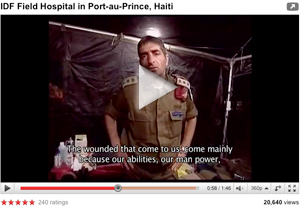The headlines of the past couple of weeks have been filled with disturbing news.
A devastating earthquake and its aftershocks in Port-au-Prince, Haiti leveled the city, leaving as many as 200,000 dead, many thousands more injured and untold numbers homeless and unemployed.
The infrastructure in the country was already very poor. With the damage wrought by the earthquake, even today, more than two weeks after the event it is exceedingly difficult, and in some cases, impossible to get food, water and medical care to those who need it.
There are some signs of reviving life. A few factories have reopened. A few merchants have begun to offer their wares again – although some are operating in the streets instead of their stores.
 Throughout it all, there has been a tremendous international effort to help, and the Israelis have been in the forefront.
Throughout it all, there has been a tremendous international effort to help, and the Israelis have been in the forefront.
Several times Israeli rescue teams made headlines when they pulled victims from collapsed buildings, and the portable hospital that the Israelis opened in the beleaguered city garnered international attention as a first-rate operation. When the injured were brought to other countries’ medical teams for help, those patients with the greatest needs were referred to the Israeli hospital where they were assured of better care.
It has been a rare moment when Israel garnered well-deserved international praise.
The Jewish community as a whole can be proud of our response to the disaster in Haiti. Louisvillian Jonathan Katz (see story, page 6) is an Associated Press reporter stationed in Haiti. He lived through the earthquake, experienced personal loss, and has been working continuously, ensuring that the world knows about the situation there. For the first two days, he was the only reporter on the ground.
The American Jewish Joint Distribution Committee (JDC) immediately opened a mailbox (www.jdc.org or P.O. Box 530, 132 E. 43rd Street, New York, NY 10017, Attn.: Haiti Crisis) to collect funds to help. They are working closely with a number of aid organizations on the ground to deliver the necessary assistance.
American Jewish World Service (AJWS) has also established an Earthquake Relief Fund at http://www.ajws.org/haitiearthquake.
Locally, Keneseth Israel and Temple Shalom have been engaged in a project to help a small community in Haiti since last summer. Following the earthquake, they expanded their efforts to include earthquake relief and have raised $17,000 – $10,000 for earthquake relief and $7,000 for a water purification project in Ravine Sable.
National security has also been in the news, and last week, a plane carrying two Jewish teens to visit their grandmother in Louisville made an emergency landing. A stewardess observed Caleb Leibowitz praying with tefillin. Unsure of what they were and suspicious that they might be explosives, she reported her concerns to the pilot who decided to make an emergency landing to have the authorities check it out. (For details, see story, page 1.)
While this was an uncomfortable situation for Leibowitz and his sister, it has also been an invaluable teaching moment for the Jewish community.
With national security issues in the spotlight, this incident drew media coverage across the country. Many people who may not have encountered the Jewish prayer ritual of tefillin learned that tefillin are small boxes with long straps that contain verses of Biblical text and observant Jews wear one on their heads and one on their arms during daily morning prayers.
Perhaps the next Jew who chooses to don tefillin and pray while aboard an airplane will be able to do so without a problem because the staff will have learned about this Jewish ritual from this incident.


